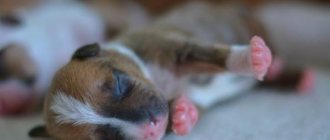While puppies bring almost immeasurable joy to the lives of people everywhere, the first couple of months are often exhausting. Unfortunately, your life will revolve around your puppy's bladder (and tummy) to a ridiculous degree.
If you're not standing outside in the cold trying to coax your little puppy to pee, you're inside cleaning up a puddle on the kitchen floor (if you're lucky, some people prefer to water the carpet).
You'll learn to be vigilant like a mother hen, trying to interpret your dog's sniffing behavior so you can catch him before he lifts his leg.
But sometimes small puppies pee even more often than usual. This should serve as a warning and you should not simply ignore the problem.
What to do
If your dog starts urinating in the house, the first thing to do is take him to a veterinarian to rule out the possibility of a serious illness. If she is suffering from a certain disease, there is a possibility that after treatment the problem will also disappear.
However, if the problem is age-related or chronic and the urinary problem cannot be corrected, consult with your veterinarian to find a compromise solution that will make your dog's care and life easier. You may need to walk your dog or let him outside more often, or designate a place to place the diaper when you are away from home. Dog diapers will also help reduce the number of unpleasant incidents.
Regarding urinary problems due to behavioral difficulties, also consult your veterinarian. For more serious problems, such as separation anxiety, a canine behaviorist can help and prescribe appropriate treatment to address the urinating problem in the home. You can also consult with a dog trainer about a repeat training course to teach your dog the dos and don'ts. To clean the places where the dog left puddles, you should use enzymatic household chemicals to remove the smell and traces of urine and eliminate the possibility of repeated disgrace in the same place.
Don't punish your dog for urinating in the house, as dogs don't always associate bad behavior with punishment, which can make the situation worse. Especially if you leave the dog at home alone, and when you return, you see the consequences in the form of a puddle, but do not catch the dog “in the act.” Despite popular myth, you should not rub her nose in a puddle of urine, as she will likely not make the connection between bad behavior and the appropriate punishment. Instead, focus on rewarding your dog's good behavior when he goes to the toilet outside, such as treats, praise and love. You can even reward her for wanting to go outside when she sits at the front door or rings the bell.
It's hard to stay calm and patient when your dog has ruined your favorite rug or you're tired of cleaning up puddle after puddle, but it helps to see that urination problems are not a sign of defiant defiance, but rather a cry for help. Regardless of whether the problem is behavioral or medical, identifying what it is will help you get rid of it and stop your dog from getting dirty in the house.
Causes
There are a number of different reasons why your puppy is peeing frequently, so don't expect your vet to give a quick and easy answer.
He or she will likely need to perform several tests—starting with a history and urine test, but possibly moving on to blood tests and imaging—before making a diagnosis.
Diabetes
Diabetes is a disease in which the pancreas either fails to produce enough insulin (the hormone used to process glucose, or blood sugar), or the body becomes insensitive to the insulin it produces.
Either way, the result is high blood sugar, which causes the puppy's kidneys to release water, thereby stimulating the puppy to empty its bladder. Another common symptom of diabetes is excessive thirst, which makes urinary problems worse.
Diabetes is often a congenital condition that can affect puppies at a relatively early age. Although diabetes can be treated, it cannot be cured. Naturally, it is important to consult your veterinarian any time you suspect your dog has diabetes. You may also need to switch your puppy to diabetic dog food.
Urinary tract infection
Just like in humans, urinary tract infections can cause puppies to have a frequent and urgent need to urinate.
Urinary tract infections are usually easy to treat, although some specific strains of bacteria are more difficult to eradicate than others. So, as always, immediate veterinary treatment is mandatory.
Please note that some puppies may develop urinary tract infections around the genital opening. In these cases, neutering is usually the most effective treatment rather than antibiotics.
Kidney infection
Kidney infections can cause many of the same symptoms as urinary tract infections and may cause your puppy to go outside more often.
Like urinary tract infections, kidney infections can often be treated with antibiotics.
© shutterstock
Bladder stones
Stones can cause your puppy to pee frequently. Often stones of any type will cause blood in the urine, but this can also occur with serious kidney or bladder infections, so it is not diagnostic.
Stones are often very painful for your puppy, and they can even be life-threatening, so be sure to seek immediate veterinary help when you suspect this type of problem.
Stones in the kidneys
Kidney stones can also make your puppy want to pee frequently. However, kidney stones are not as common in dogs as they are in people—in many cases, they don't even require treatment.
However, you should still definitely seek help from your veterinarian as stones can sometimes block your dog's ureter, which can be a life-threatening problem.
Medicines
Some medications can cause a puppy (or an adult dog, for that matter) to urinate more often than usual. Most veterinarians will warn you of this possibility in advance to ease any possible anxiety on your part.
Tumors
In rare cases, tumors in the brain or spinal cord can put pressure on the nerves between the brain and your puppy's bladder, which can impair their ability to control their bladder. For example, although it does not occur often in puppies, some older dogs suffer from Cushing's disease.
This disease usually involves the growth of a benign (noncancerous) brain tumor that puts pressure on the pituitary gland. This, in turn, causes hormone levels to become abnormal, which can lead to frequent urination.
Attention-getting behavior
Sometimes puppies that are understimulated may pee frequently to get attention. Although attention is often negative (“No! Bad puppy! Don’t pee in the house!!!”), it is better for the puppy than no attention at all.
Luckily, this is one of the easiest causes of frequent urination to treat. You just need more stimulation, exercise, and attention for your puppy!
So, get off the couch (or computer) and go play or wander around the park with your pup!
Anxiety
Many dogs, especially nervous little toy breeds (no disrespect), pee whenever they get nervous.
While this is obviously better than a medical cause of excessive urination, it can often be a little more difficult to correct.
In many cases, extra exercise, stimulation and socialization can help, but it can also be helpful to provide excited puppies with a good “haven” to retreat to when they get nervous. Dog beds are one popular way to provide small breeds with a cozy, safe space in which they can feel safe.
In many cases, these dogs may need the help of a professional trainer to feel safer and stop peeing frequently.
Causes of Yorkie Frequent Urination
There are times when your Yorkshire Terrier may urinate on its diaper more often than usual. This article is about the reasons why your Yorkie is urinating frequently.
Firstly, we advise you not to immediately panic. It is not at all necessary that more frequent urination in a puppy or adult dog means a serious health problem. Compare it with a walk, when a dog, by natural instincts, can go to the toilet “little by little” up to 20-30 times. At the same time, unreasonably frequent walking on or past the diaper should attract your attention.
The question of how many times a day a dog should urinate is purely individual and depends on many factors (temperature in the home and outside, the presence of drafts, type of floor, type and amount of food, water consumption, etc.). However, puppies usually urinate more often than adult dogs. To prevent possible inflammatory processes from becoming chronic, pay attention to the puppy’s sleeping place. It is not recommended that his sleeping place be on the floor. Use a bedding or a special sleeping place such as a rug or bed. As for the number of urinations per day, about 10-12 times are considered normal for a puppy under 3 months of age (the so-called quarantine period); about 8 times – at the age of 3-6 months; about 6-7 times after 6 months.
There are different reasons for your Yorkie's frequent urination. Therefore, if you notice that such cases occur with significant periodic regularity, it is worth paying attention to possible features: – more frequent feeding/sharp change in the type of food (with natural dry food substitutes, more frequent urination may occur); – depending on the time of year, temperature (hot days) and general activity, the dog may drink water more often; – apartments/houses may be cool or there may be drafts (this can lead to cystitis); – Bitches usually urinate more frequently before estrus; – inflammation/disease of the kidneys and urinary tract (in this case, a urine test will show an increased content of leukocytes); – a disease transmitted by inheritance (the chronic form of frequent urination leads to such a possible assumption.
By the way, regarding cystitis, there are possible cases when this disease may occur in a dog that is a “household/indoor” pet. Therefore, this possible reason should not be immediately discounted if you do not take your Yorkshire Terrier for walks.
In any case, we recommend that you keep the situation under control. It is advisable to undergo a urine test and possibly an ultrasound in order to narrow down possible assumptions regarding possible urinary tract diseases. Be sure to consult a good veterinarian for advice. For your own peace of mind and the health of your Yorkie. Do not be ill!
——————————————————————————————————————————
We are trying very hard for you! Please support us and become our subscribers. Latest news and important updates on VKontakte and Twitter.
Read @yorkshir_by #york in Belarus; #Yorkshire in Belarus; #Yorkshire Terrier in Belarus; #Belarusian site about the Yorkshire terrier; #site about the Yorkshire terrier; #site about Yorkies; #buy a Yorkie in Minsk; #buy Yorkshire terrier in Minsk
When should you start worrying?
If your baby goes to the toilet too often, as you think, you may really be worrying in vain. All pets are individual, and sometimes a completely healthy kitten can pee more than 10 times a day. However, if you see other symptoms and unhealthy changes in the behavior and condition of the puppy, when the latter also relieves himself more than 12 times a day (especially if you have not noticed that he drinks a lot during the day, and you feed him dry food, and not natural food) you should seriously worry about the baby’s health.
Normal urination rate in puppies
Adult dogs can hold their bladder for an impressively long time. Many only need three trips outside per day, meaning they wait at least 8 hours between pit stops.
But young puppies, who have much smaller bladders and much less bladder control, should be allowed to pee much more often.
© shutterstock
Even if it seems like your dog is peeing inside the house right after he went outside, it might already seem like an eternity for your little buddy!
For example, an adult dog may drain his water bowl and then fall asleep on the couch throughout the night before needing to pee in the morning.
Conversely, puppies usually need to empty their bladder within 10 to 30 minutes of filling their tanks.
As a general rule, small puppies (under 6 months) should be taken out every hour or two. The Canine Academy suggests that puppies can wait the same number of hours as an adult dog when they are around 9 months old.
This means that a one month old puppy will need to pee every hour and a five month old puppy will need to pee every 5 hours.
So, if your 5 month old puppy needs a break every hour or two, something is probably wrong and you should consult your veterinarian to get your puppy the help he needs.
Your veterinarian can help you treat medical problems, but if your puppy is healthy, the root of the problem is likely behavioral. You will have to correct these problems (perhaps with the help of a trainer or behaviorist).
How many times should a puppy pee a day?
A puppy can be compared to a human child: both have a much faster metabolism than an adult dog and an adult human, which is why babies go to the toilet often.
However, everything is very individual for each kitten and depends on various factors. Depending on the age of the baby, the amount of water he consumed per day, the air temperature in the environment where he is, what method you prefer in feeding the puppy - natural food or dry food, and the frequency of your baby's walking will depend on toilet. But on average it varies from 5-6 to 10 urinations per day .











